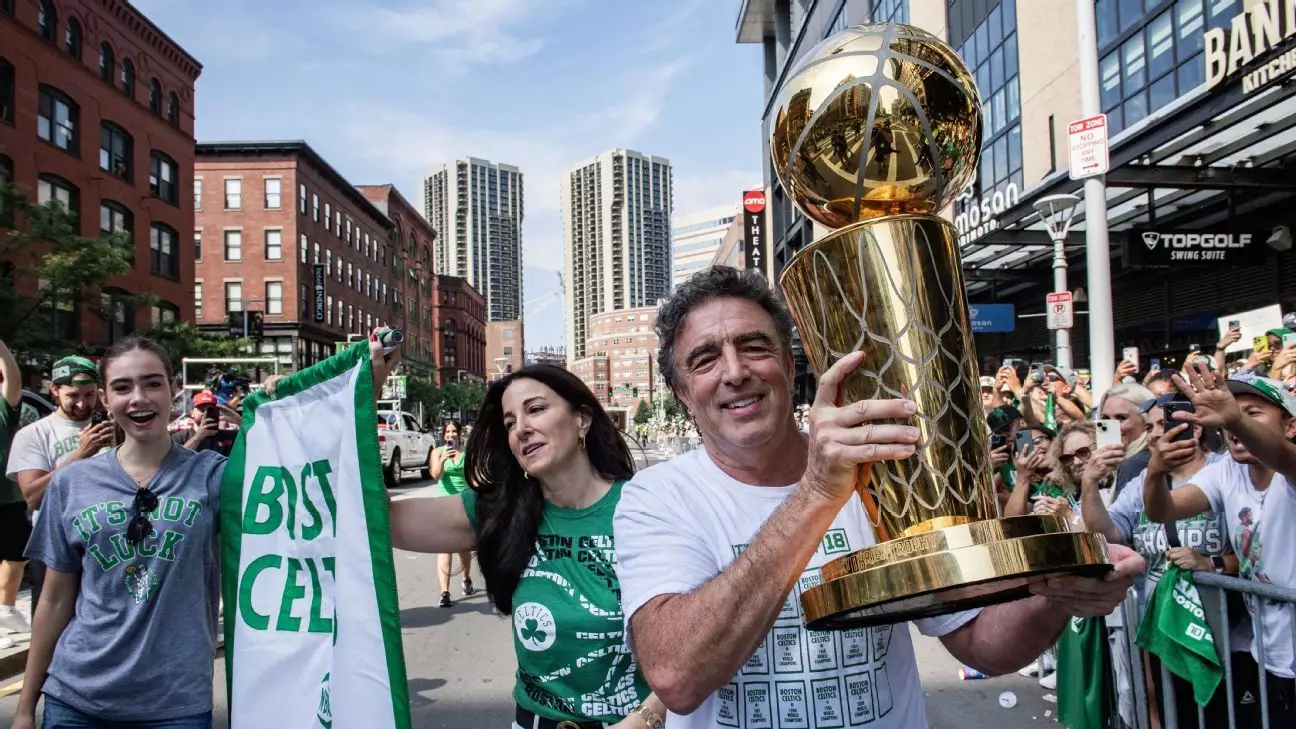In a stunning development for the sports world, the Boston Celtics have been sold for a groundbreaking $6.1 billion to Bill Chisholm, managing partner at Symphony Technology Group. This transaction not only breaks the record for the highest sale price of an American sports franchise—exceeding the previous record of $6.05 billion established with the sale of the Washington Commanders—but also serves as a testament to the soaring values of professional sports teams in the United States. The ever-increasing financial stakes reflect not just the legacy of these franchises but also the lucrative potential of sports as a global entertainment industry.
The sale of the Celtics, particularly at this peak moment following their recent championship win in the 2024-25 season, showcases how a team’s performance, reputation, and marketability contribute significantly to its valuation. The Celtics have not only a rich history in the NBA—boasting 17 championships—but also an immense fan base and brand equity that transcend sport. The management team’s foresight and competency in maintaining the franchise’s competitive edge have made it an attractive asset for investors looking to capitalize on the sports revolution.
Comparative Analysis of Historical Sales
To appreciate the significance of this monumental sale, it’s essential to delve into the context of recent franchise transactions. The NFL’s Washington Commanders, sold for $6.05 billion amid controversial circumstances surrounding former owner Dan Snyder, marked a pivotal moment in franchise sales history. Snyder’s tumultuous tenure, riddled with investigations and scandals, may have deterred potential buyers, yet the ultimate price reflects the high stakes associated with ownership in professional sports.
Similarly, the Denver Broncos’ sale for $4.65 billion represented a significant leap in valuation, further underscoring the trends of increasing financial investment in sports. Rob Walton’s acquisition was a landmark move, solidifying the franchise’s worth while reinforcing the notion that owning a professional team is one of the ultimate status symbols in America.
Moreover, the purchase of the Phoenix Suns for $4 billion by Matt Ishbia marked another high point for the NBA. Ishbia’s ties to the sport as a former player underscore a growing trend of ownership by individuals with personal connections to basketball. This trend is becoming increasingly significant as fan engagement rises and the sporting world’s demographics evolve.
The Future Landscape of Sports Ownership
As prices soar and records tumble, the landscape of sports ownership is rapidly changing. The trend suggests an influx of capital from rich investors looking to diversify their portfolios or secure a legacy through sports ownership. With figures like Jeff Bezos and Elon Musk hovering over the sidelines, the conversation surrounding franchise acquisitions is becoming increasingly competitive. It is a game of both dollars and prestige.
Moreover, the ongoing commercialization of sports—driven by lucrative media rights deals, sponsorship agreements, and merchandise sales—promises to further inflate franchise values. This is particularly evident in the NBA, where the potential for global reach and revenue generation is unmatched compared to any other professional league. The Celtics represent not only a successful basketball franchise but a lucrative business opportunity in a rapidly evolving global sports ecosystem.
The Interplay of Performance and Financial Worth
While many considerations factor into the sale of a sports franchise, team performance undeniably plays a crucial role. A team that is consistently competitive in the playoff picture attracts critical attention, driving up attendance, merchandise sales, and follower engagement across multiple platforms. The Celtics’ successful run positions it as a premier asset; the combination of historical prestige and recent triumph has made it an ideal purchase for Chisholm.
Furthermore, as sports franchises increasingly morph into multifaceted entertainment enterprises, the focus broadens from on-court performance to off-court business strategies. Savvy ownership groups are leveraging technology and analytics, creating fan engagement initiatives, and expanding into digital media platforms to maximize profitability. The Celtics’ stellar performance will undoubtedly allow for innovative marketing strategies, making it a hotbed for potential revenue streams.
The Ripple Effects on the Sports Economy
The transaction between Chisholm and the Grousbeck family signals an unmistakable ripple effect throughout the sports economy. As ownership values reach historic proportions, the implications ripple down to players, fans, and local economies. As franchises increasingly become cash cows, the league may witness an influx of wage growth for players and better facilities for fans, translating into a richer and more profound sports experience.
Additionally, the rise in franchise values sends a clear message to investors and stakeholders within the sports industry: the thriving, dynamic market for sports ownership is here to stay—and it holds extraordinary potential. The Celtics’ sale not only sets a new benchmark but also symbolizes the undying fanfare and fervor for one of America’s oldest pastimes. It opens a new chapter in sports economics, with implications that will undoubtedly shape the future landscape of professional sports for generations to come.

